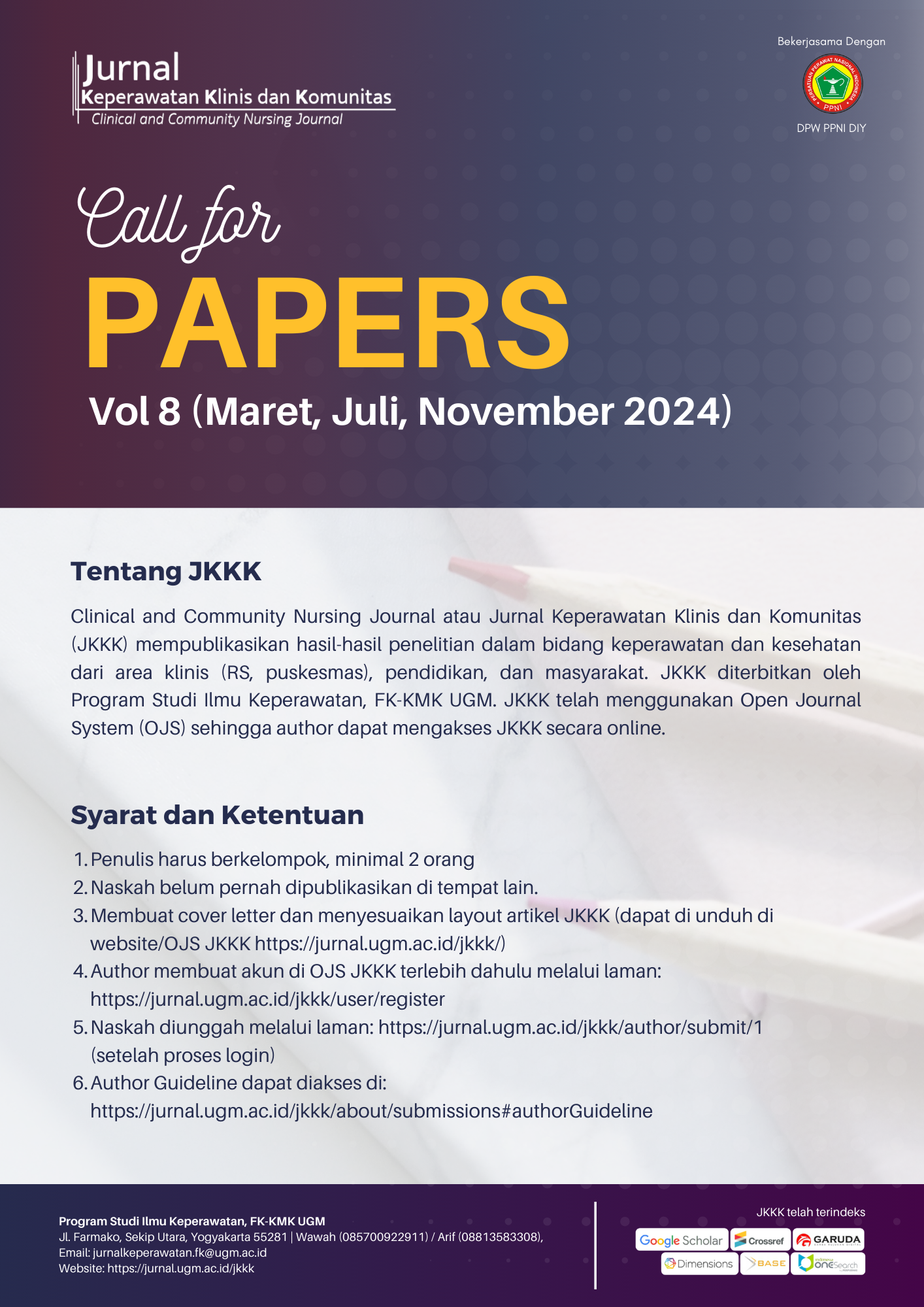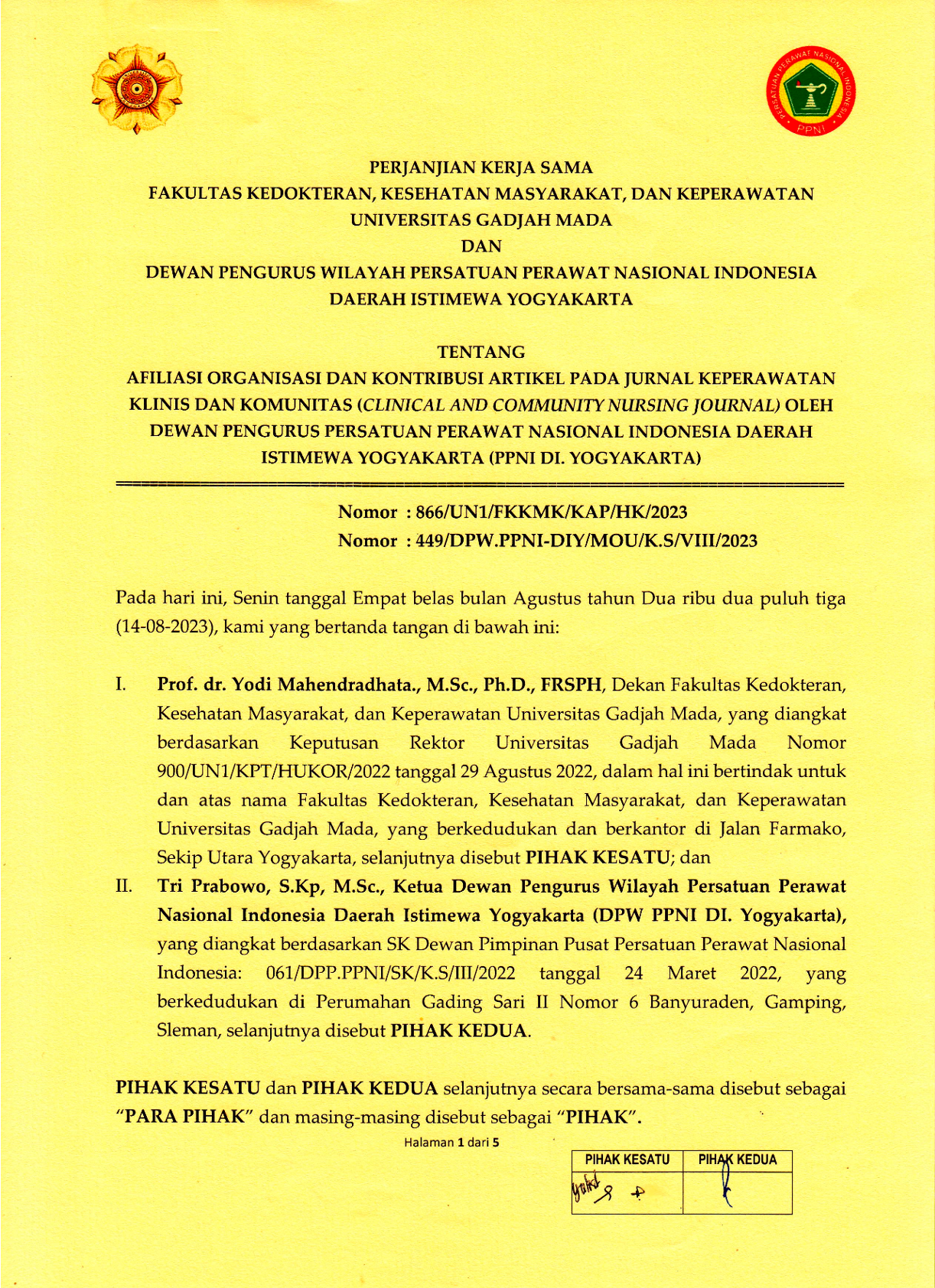Hubungan antara Stres dengan Kualitas Tidur Remaja di Balai Perlindungan dan Rehabilitasi Sosial Remaja Yogyakarta
Kusuma Ayu Rachmasari(1), Sri Hartini(2*), Itsna Lutfi Kholisa(3), Yayi Suryo Prabandari(4)
(1) Program Studi S1 Ilmu Keperawatan Fakultas Kedokteran, Kesehatan Masyarakat, dan Keperawatan Universitas Gadjah Mada
(2) Departemen Keperawatan Anak dan Maternitas Fakultas Kedokteran, Kesehatan Masyarakat, dan Keperawatan Universitas Gadjah Mada
(3) Departemen Keperawatan Anak dan Maternitas Fakultas Kedokteran, Kesehatan Masyarakat, dan Keperawatan Universitas Gadjah Mada
(4) Departemen Ilmu Perilaku, Lingkungan dan Sosial Kedokteran, Program Studi Kesehatan Masyarakat, Fakultas Kedokteran, Kesehatan Masyarakat, dan Keperawatan, Universitas Gadjah Mada
(*) Corresponding Author
Abstract
Background: The unresolved conflict which is experienced by adolescent may cause stress. Stress on adolescents is reversible but may lead to serious impact if not properly dealt with. Emotional disorder like stress may affect the quality of sleep on adolescents.
Objective: To identify the correlation of stress with quality of sleep in Youth Protection and Social Rehabilitation Center (Balai Perlindungan and Rehabilitasi Sosial Remaja/BPRSR) of Yogyakarta.
Method: This research was correlational descriptive with cross sectional design. The research was conducted at BPRSR Yogyakarta. There were 52 adolescents as sample which was determined by total sampling method. Data were collected using two questioners i.e. Pittsburg Sleep Quality Index (PSQI), to measure the quality of sleep, and Perceived Stress Scale (PSS-10) to measure stress on adolescents. Data were analyzed using spearman rank test to figure out the correlation between stress and quality of sleep of.
Result: The prevalence of moderate stress was 88,46% among respondents, while 80,77% of adolescents had poor quality of sleep. The analysis conducted showed no significant correlation between stress and quality of sleep (p=0,564). The analysis on external factor revealed the correlation between drug consumption and quality of sleep.
Conclusion: No significant relation is found between stress and quality of sleep among adolescent in Youth Protection and Social Rehabilitation Center (BPRSR) of Yogyakarta.
Latar belakang: Konflik yang dialami oleh remaja dan tidak terselesaikan dengan baik dapat menyebabkan stres pada remaja. Stres pada remaja bersifat reversible, namun akan berdampak serius jika tidak ditangani dengan baik. Gangguan mental emosional berupa stres dapat memengaruhi kualitas tidur pada remaja.
Tujuan: Mengetahui hubungan stres dengan kualitas tidur pada remaja di Balai Perlindungan dan Rehabilitasi Sosial Remaja Yogyakarta (BPRSR).
Metode: Penelitian ini merupakan penelitian deskriptif korelasional dengan rancangan cross sectional. Penelitian yang dilakukan di BPRSR Yogyakarta ini, menggunakan sampel sebanyak 52 remaja, dengan metode total sampling. Data kualitas tidur dan stres pada remaja dikumpulkan melalui kuesioner Pittsburg Sleep Quality Index (PSQI) dan Perceived Stress Scale (PSS-10). Analisis data menggunakan uji Spearman Rank untuk mengetahui hubungan antara stres dengan kualitas tidur remaja di BPRSR.
Hasil: Diketahui prevalensi stres level sedang, pada remaja di BPRSR sebesar 88,46% dan sebanyak 80,77% remaja memiliki kualitas tidur buruk. Hasil analisis uji hubungan menunjukkan bahwa tidak terdapat hubungan yang signifikan antara stres dengan kualitas tidur (p=0,564). Hasil analisis faktor luar ditemukan adanya hubungan antara konsumsi obat dengan kualitas tidur.
Kesimpulan: Tidak terdapat hubungan signifikan antara stres dengan kualitas tidur remaja di BPRSR Yogyakarta.
Keywords
Full Text:
PDFReferences
- Santrock JW. Life-Span Development-13th Ed. New York: Erlangga; 2011.
- Ikatan Dokter Anak Indonesia. Masalah Kesehatan Mental Emosional Remaja [homepage on the internet]. 2013 [cited 2013 September 10]. Available from: http://www.idai.or.id/artikel/seputar-kesehatan-anak/masalah-kesehatan-mental-mosional-remaja.
- Kemenkes. Riset Kesehatan Dasar 2013. Jakarta: Kementerian Kesehatan RI; 2013.
- Merikangas KR, He J, Burstein M, Swanson SA, Avenevoli S, Cui L, Swendsen J. Lifetime Prevalence of Mental Disorders in U.S. Adolescents: Results from The National Comorbidity Survey Replication-Adolescent Supplement (NCS-A). Journal of The American Academy of Child & Adolescent Psychiatry. 2010: 49(10); 980-989. https://doi.org/10.1016/j.jaac.2010.05.017.
- Wiguna, T. Masalah Kesehatan Mental Remaja di Era Globalisasi [homepage on the internet]. 2013 [cited 2013 September 10]. Available from: http://www.idai.or.id/artikel/seputar-kesehatan-anak/masalah-kesehatan-mental-remaja-di-era-globalisasi.
- Moser D, Pablik E, Aull-Watschinger S, Pataraia E, Wober C, Seidel S. Depressive Symptoms Predict The Quality of Sleep in Patients with Partial Epilepsy-A Combined Retrospective and Prospective Study. Epilepsy Behav. 2015: 104-110. https://doi.org/10.1016/j.yebeh.2015.04.021
- Maas JB, Robbins RS, Fortgang RG, Driscoll SR. Adolescent Sleep. Academic Press. 2011: 60. https://doi.org/10.1016/B978-0-12-373951-3.00039-9.
- National Sleep Foundation. Teens and Sleep [homepage on the internet]. c2017. [cited 2017 Jun 9]. Available from: https://sleepfoundation.org/sleep-topics/teens-and-sleep.
- Brand S, Kirov R. Sleep and Its Importance in Adolescence and in Common Adolescent Somatic and Psychiatric. International Journal of General Medicine. 2011; 425-442. https://doi.org/10.2147/IJGM.S11557.
- Lund H, Reider B, Whiting A, Prichard J. Sleep Patterns and Predictors of Disturbed Sleep in A Large Population of College Students. Journal of Adolescent Health. 2010; 46(2), 124-132. https://doi.org/10.1016/j.jadohealth.2009.06.016.
- Romanzini LP, Santos AA, Nunes ML. Characteristics of Sleep in Socially Vulnerable Adolescents. Journal of European Pediatric Neurology Society. 2017; 21: 627-634. https://doi.org/10.1016/j.ejpn.2016.12.013.
- Chen DR, Truong K, Tsai MJ. Prevalence of Poor Sleep Quality and Its Relationship with Body Mass Index Among Teenagers: Evidence from Taiwan. Journal of School Health. 2013; 83(8): 582–588. https://doi.org/10.1111/josh.12068.
- Utami NP. Hubungan Pola Tidur terhadap Asupan Energi dan Obesitas pada Remaja SMP di Kota Yogyakarta [Skripsi]. Yogyakarta: Fakultas Kedokteran, Kesehatan Masyarakat, dan Keperawatan, Universitas Gadjah Mada; 2013.
- Chung KF & Cheung MM. Sleep-Wake Patterns and Sleep Disturbance among Hongkong Chinese Adolescents. Sleep. 2008; 31(2): 189.
- Byrne D, Davenport S, & Mazanov J. Profiles of Adolescent Stress: The Development of The Adolescent Stress Questionnaire (ASQ). Journal of Adolescence. 2007; 30: 393-416.
- Roy K, Kamath VG, Alex J, Hegde A. Prevalence of Stress and Stress Tolerance Levels among Adolescent Boys - A District Level Cross Sectional Study in South India. International Journal Adolescent Medical Health. 2015;1-7.
- Lyu SY, Chi YC, Farabee D, Tsai LT, Lee MB, Lo FE, Morisky DE. Psychological Distress in An Incarcerated Juvenile Population. Journal of The Formosan Medical Association. 2015; 114(11): 1076-1081. https://doi.org/10.1016/j.jfma.2014.03.011.
- Masdar H, Saputri PA, Rosdiana D, Chandra F, Darmawi. Depresi, Ansietas, dan Stres serta Hubungannya dengan Obesitas pada Remaja. Jurnal Gizi Klinik Indonesia. 2016; 12(4): 138-143. https://doi.org/10.22146/ijcn.23021
- Hanifah R. Hubungan Stres dan Asupan Natrium dengan Tekanan Darah pada Remaja SMA di Kota Yogyakarta [Skripsi]. Yogyakarta: Fakultas, Kedokteran Kesehatan Masyarakat, dan Keperawatan, Universitas Gadjah Mada; 2016.
- Buysse D, Reynolds C, Monk T, Berman S, Kupfer D. The Pittsburgh Sleep Quality Index: a New Instrument for Psychiatric Practice and Research. Psychiatry Research. 1989; 28(2): 193-213. https://doi.org/10.1016/0165-1781(89)90047-4.
- Indrawati BN. Perbandingan Kualitas Tidur Mahasiswa yang Mengikuti UKM dan Tidak Mengikuti UKM pada Mahasiswa Reguler FIK UI [Skripsi]. Depok: Fakultas Ilmu Keperawatan, Universitas Indonesia; 2012.
- Cohen S, Kamarck T, Mermelstein R. A Global Measure of Perceived Stress. Journal of Health and Social Behavior. 1983; 24(4): 385-396. https://doi.org/10.2307/2136404.
- Bhat R, Ramesh, Ganaraja B, Sameer M. Eustress in Education: Analysis of The Perceived Stress Score (PSS) and Blood Pressure (BP) During Examinations in Medical Student. Journal of Clinical and Diagnostic Research. 2011; 5(7): 1331-1335.
- Galland BC, Gray AR, Penno J, Smith C, Lobb C, Taylor RW. Gender Differences in Sleep Hygiene Practices and Sleep Quality in New Zealand Adolescents Aged 15 To 17 Years. Sleep Health. 2017; 3(2): 77-83. https://doi.org/10.1016/j.sleh.2017.02.001.
- Backman H, Laajasalo T, Saukkonen S, Salmi V, Kivivuori J, Aronen E. Are Qualitative and Quantitative Sleep Problems Associated with Delinquency When Controlling for Psychopathic Features and Parental Supervision?. Journal of Sleep Research. 2015; 5(24): 543-548. https://doi.org/10.1111/jsr.12296.
- Wulandari RP. Hubungan Tingkat Stres dengan Gangguan Tidur pada Mahasiswa Skripsi di Salah Satu Fakultas Rumpun Science-Technology UI [Skripsi]. Depok: Fakultas Ilmu Keperawatan, Universitas Indonesia. 2012.
- Schalkwijk FJ, Blessinga AN, Willemen AM, Werf YD, Schuengel C. Social Support Moderates The Effects of Stress on Sleep in Adolescents. Journal of Sleep Research. 2015; 24(4): 407-413. doi: https://doi.org/10.1111/jsr.12298.
- Almojali AI, Almalki SA, Alothman AS, Masuadi EM, Alaqeel MK. The Prevalence and Association of Stress with Sleep Quality among Medical Students. Journal of Epidemiology and Global Health. 2017;1-6. doi: https://doi.org/10.1016/j.jegh.2017.04.005.
- Mesquita G, Reimao R. Stress and Sleep Quality in High School Brazilian Adolescents. Annals of Brazilian Academy of Sciences. 2010; 82(2); 545-551. http://dx.doi.org/10.1590/S0001-37652010000200029.
- Harvard Health Publishing. Medication that Can Affect Sleep [homepage on the internet]. c2010. [cited 2018 Jul 16]. Available from https://www.health.harvard.edu/newsletter_article/medications-that-can-affect-sleep
- National Sleep Foundation. Sleepiness, Medication & Drugs: Why Your OTC Medications and Prescription Drugs Might Make You Tired. [homepage on the internet]. c2018. Available from https://sleepfoundation.org/excessivesleepiness/content/sleepiness-medication-drugs-why-your-otc-medications-and-prescription-drugs-might-make-you.
- Berman A, Snyder SJ, Kozier B, Erb G. Fundamentals of Nursing Concepts, Process, and Practice (8th ed.). New Jersey: Pearson Education; 2008.
Article Metrics
Refbacks
- There are currently no refbacks.
Copyright (c) 2021 Kusuma Ayu Rachmasari, Sri Hartini, Itsna Lutfi Kholisa, Yayi Suryo Prabandari

Jurnal Keperawatan Klinis dan Komunitas (Clinical and Community Nursing Journal)
collaborates with DPW PPNI DIY
![]()
Jurnal Keperawatan Klinis dan Komunitas (Clinical and Community Nursing Journal) is licensed under a Creative Commons Attribution-ShareAlike 4.0 International License.





